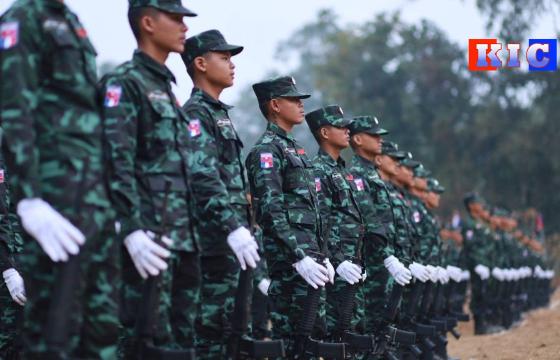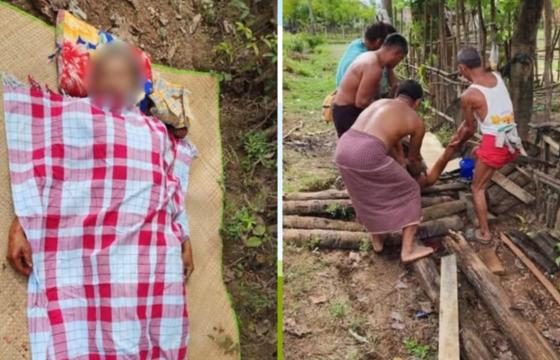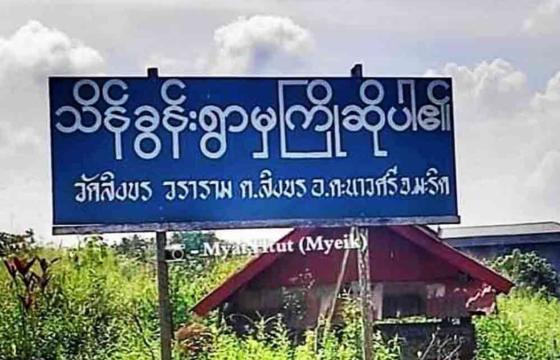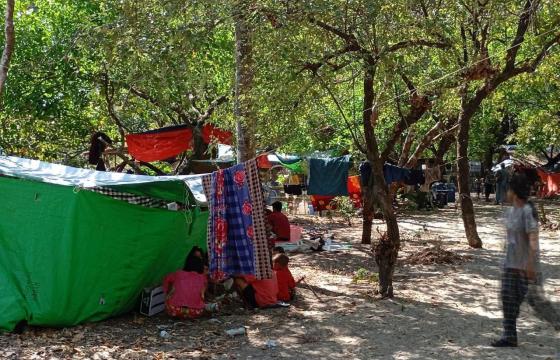David Tharckabaw, head of the Karen National Unions Alliance Affairs, in an exclusive interview with Karen News, explains why he is opposed to the current Nationwide Ceasefire Agreement that he believes will deliver little for the majority of ethnic people and only benefit a few people.
Mr Tharckabaw said he was not against a nationwide ceasefire that was in the interest of the ethnic people.
“I am not opposed to a National Ceasefire Agreement that will lead to real peace. But I am against this National Ceasefire Agreement, because it is not going to lead to real peace.”
Mr Tharckabaw said he was dismayed at the lack of respect paid to the ethnic leaders while attending peace talks.
“There is no equality [shown] to the ethnic leaders. There is no clear political road map. And there is no inclusiveness.”
THEY WANT OUR NATURAL RESOURCES
Mr Tharckabaw said the current NCA was a strategy by the government to get its hands on Karen controlled land and that of the other ethnic armed groups.
“Not all the ethnic state holders are included in this process. This National Ceasefire is for development that will benefit a few people. Not for the general masses. I mean development to get the natural resources of the ethnic people. It’s not going to benefit the ethnic people.”
Mr Tharckabaw stressed that the government’s objective on the land so it could mine for minerals and precious stones.
“Its aim is to get the natural resources – the natural resources of the ethnic people. They even plan to drive out ethnic people in the hills on to the plains. Then they will have a free hand. They intend to have a free hand to loot the natural resources – we have timber, and there are all kind of minerals, and gemstones. Of course, the most important natural resources are the industrially important minerals.”
WE WANT EQUALITY, PEACE AND STABILITY
Mr Tharckabaw was adamant that the Karen revolution was nowhere near its end.
“This is not the end of the Karen political struggle. It will go on in another form. There are 10 million Karen people in the country. And have to and they will get involve in this process. In this struggle for our freedom, equality and what we call self-determination, the right to develop ourselves. That will go on, the struggle will go on for those political objectives.”
Mr Tharckabaw pointed out that the Karen struggle “needs real support from the people in terms of unity and other ideas about development that will benefit the people.”
Mr Tharckabaw said that the recent Burma Army offensives were an indication of the government’s real intent.
“There has been fighting by the government troops in the DKBA area, the Kachin area, the Kokang area, Paloung area – so we are questioning the sincerity of the government. They are carrying out brutal war against some ethnic groups.”
Mr Tharckabaw told Karen News that the government’s strategy was well known to ethnic armed groups. “We have seen it before, they attack some and some they try to pamper.”
Mr Tharckabaw explained that the [ethnic] armed groups objectives were not complicated
“We want political rights, peace and stability. Only after that, can we have real development. Our political rights are very simple. We want equality and the right to develop ourselves. No oppression, or domination by the central power. We should have autonomy. We should not have the exploitation of our people and our natural resources. That is what we are fighting against.”
ARMY OUT OF GOV’T’s CONTROL
Mr Tharckabaw said that he was concerned that the government’s military forces were out of control.
“The Burma Army appears not to take its orders from the government, they have their own system to carry on war and this war is totally against the people. The area they target is that of civilians. They have committed wide spread human right violations. They are still committing them, even though they say they are under a democratic government. They are not under the control of the government.”
Mr Tharckabaw explained to Karen News that he believed that the NCA and the peace talks was devised to split the ethnic armed groups.
“The Nationwide Ceasefire and the so-called peace process is the government’s strategy to divide the ethnic armed groups, the resistant groups. They give favor to some, but they carry on war against others. And they spread propaganda, so there will be misunderstanding among the ethnic people, among the ethnic groups. So, there is a strategy to divide and conquer. Not to resolve the real ethnic problems.”
IF WE ARE UNITED, WE ARE THE MAJORITY
Mr Tharckabaw was keen to point out that the ethnic groups, if they could be united had the numbers to make life difficult for the government.
“The ethnic groups altogether form nearly 70% of the people of the country. But the [government’s] propaganda all along has been that the Burman people form nearly 70%. That is the opposite. And if we are united, we can gain our political rights in a short time. Our political (we can) unity can decide our own destiny to have self-government to cooperate in joining a federal union. We can gain our rights in short time, if we have real unity. That’s why the government since independence has been tried to divide the ethnic unity.”
Mr Tharckabaw acknowledged that the ethnic groups capacity to divide and form factions was a huge disadvantage in gaining political power.
“Because there are seven ethnic peoples, the unity is not fool proof. The unity is not iron-clad unity. But, I think after more than 60-years of struggle, I think the ethnic people should realize that we have to hang together, other wise we will hang separately. Like the saying goes, they must get together and form a very solid and strong unity.”
Mr Tharckabaw said that “the [Burman] represent only 28 % of the population. And even then not all that 28 % support the government, especially, after the military dictatorship starting from 1962. The current government is not very different from the previous military dictatorships. The military dictatorship of Ne Win – the military dictatorship of the SPDC is not very different.”
STRONG LEADERS WANTED
Mr Tharckabaw admitted that the ethnic leadership needed to be stronger and needed to demonstrate to the people that they are capable of being leaders.
“We need strong ethnic leaders with a clear understanding of the history. And a clear understanding of the enemy strategy – I’ll call them the enemy – not all Burman are bad, but those in the power are mainly ultra-nationalists. I called them fascist. And they are trying to completely dominate nearly 70% of the ethnic people. This is impossible.”
Mr Tharckabaw said it was possible that younger ethnic people returning from overseas to help the political struggle could fill the current leadership vacuum.
“Yes, we need younger leaders. And of course not to get rid of the old leaders, younger means in the age 40’s and 60’s. There are some here, but some we hope to get back from the Karen people, Shan people, Chin people and also Kachin people who resettled in other countries. I think they will come back.”
GIVE UP OUR ARMS… NOT ACCEPTABLE
Mr Tharckabaw is annoyed by quotes made to the media by Senior General Min Aung Hlaing, the commander-in-chief of the Myanmar Armed Forces, stating that the ethnic armed groups would be disarmed after NCA is signed.
“This is not acceptable because we must retain our arms. Even after ceasefire, even after peace. Because, if we have no weapons, if we have no arms to defense ourselves, then the whole country will be militarized by those ultra nationalists. General Min Aung Hlaing is one of the main ultra nationalists, a leading figure among the Burman ultra-nationalists. In the federal system the ethnic people will retain their own troops, at least to defend the union against external threats and of course to defend them selves.”








